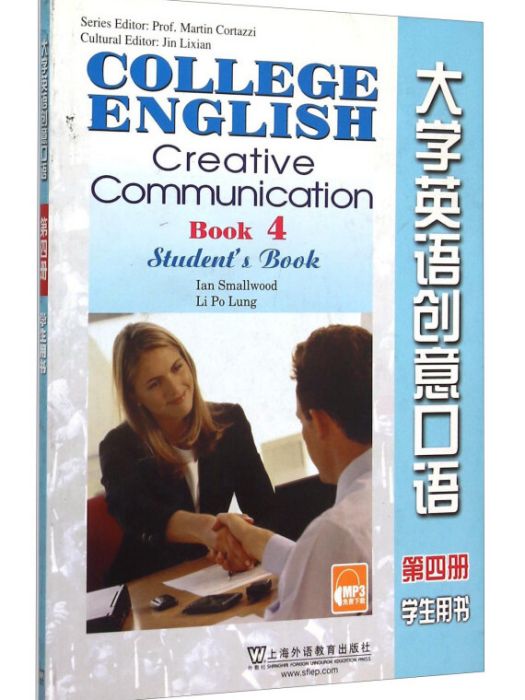《大學英語創意口語-第四冊-學生用書》是2009年8月1日上海外語教育出版社出版的圖書,作者是Ian、Smallwood、Li、Po、Lung。
基本介紹
- 中文名:大學英語創意口語-第四冊-學生用書
- 作者:Ian、Smallwood、Li、Po、Lung
- 出版社:上海外語教育出版社
- ISBN:9787544614931
內容簡介,圖書目錄,
內容簡介
The Creative Communication series of College English textbooks encourages students to be creative and flexible in speaking English, to be aware of intercultural aspects of using English and to be prepared for the College English Tests.It is written by a team of authors who have extensive experience of teaching oral English to Chinese university students, and who have a strong background in designing, writing and using textbooks. It complements the six books in the Creative Reading series of College English textbooks and features: the progressive learning of key words and phrases for oral interaction,with systematic opportunities to practise them flexibly, regular practice in focused listening for detailed information as well as.for implications, the systematic provision of information and insights into cultural aspects of using English, with participation activities which develop intercultural communication skills, the creative application of oral English to develop students' abilities to express their own ideas and opinions, solve problems, use their imagination, and work collaboratively, regular and systematic practice for College English Tests, typical test formats on the theme of each module. All these will greatly expand students' creativity in communication.
圖書目錄
MODULE ONE: "Yes, but what is culture?"
MAIN SKILLS: Making comparisons, drawing inferences, being aware of stereotypes, using
vocabulary related to culture.
UNIT 1: Drawing attention to aspects of culture, the meaning of gestures, listening to draw
inferences; naming countries and natiOnalities, word families
Culture corner: What -is culture, then? DifferenCes between and within cultures:
UNIT 2: Contrasting customs in different countries, stereotyping people from other cultures,
commenting on the importance of features of culture, using prefixes
CreatiVe speaking: Making a brief presentation about culture
MODULE TWO "How did we manage without computers?"
MAIN SKILLS: Following procedures sequencing and giving instructions; notetaking; referring
to periods of time.
UNIT 3: Discussing the influence Of cOmputers, and the development of inventions; using varied
expressions of time; using a summary to presen't information
Culture corner: Asking questions in formal contexts
UNIT 4: Sequencing instructions for downloading pictures and programmes
Creative speaking: Preparing and delivering a set of inStructions
MODULE THREE; We're destroying our own planeff
MAIN SKILLS: Identifying problems and so ut ons not ng effects; drawing c0nclusions making
brief notes.
UNIT 5i: Making brief notes on environmental issues, questioning and asking for information;
drawing inferences and conclusions noting effects
Culture corner: A linear way and/or.a circular way'different ways of tires'enting
arguments
UNIT 6: Identifying environmental problems and solutions; making comparisons and drawing
conclusions
Creative speaking: Making a group presentation on the environment
MODULE FOUR: "News is news ... but is it all good?"
MAIN SKILLS: Handling arguments for and against an issue and making notes
UNIT 7: DiscusSing news reports and photos; making complaints; using question tags; listening
for facts and figures
Culture corner: Cultural tendencies in news reporting
UNIT 8: Notetaking about misrepresentation in the media; formulating arguments for and
against an issue; pronoun references
Creative speaking: ... and the good news is ... Writing and presenting good news stories
MODULE FIVE: "What should I do with my money?"
MAIN SKILLS: Understanding and developing arguments, stating advantages and disadvantages,
and using expressions about banking and finance.
UNIT 9: Discussing and taking notes on changes in European currency systems; making genera-
lizations to agree or disagree; listening to check the accuracy of statements
Culture corner: Expressing feelings and emotions in different cultures
UNIT 10: Handling expressions used to discuss finance and banking; role playing opening a
bank account; listening to complete a form
Creative speaking: Role playing: questions from the public to a finance Minister
MODULE SIX: "It's playing, not winning that's important."
MAIN SKILLS: Describing activities and explaining rules; considering ethical aspects of sports.
UNIT 11: Describing different sports and explaining the rules; notetaking; listening for
inference
Culture corner: Aspects of c3mpetitiveness in different cultures
UNIT 12: Understanding and using general idioms which come from different sports;
considering ethics in sports; listening for key points
Creative speaking: Inventing a game and explaining it
MODULE SEVEN: "Let me think!"
MAIN SKILLS:: Proposing and expressing solutions to puzzles and problems; making comparisons,
drawing attention to differences and discussing relative merits.
UNIT 13: Giving reasons for likes and dislikes; listening to discriminate answers or to
reconstruct a context
Culture corner: Puzzles in learning and learning in puzzles —— cultural views of
classroom events
UNIT 14: Making comparisons in different Contexts, drawing attention to differences and
discussing the relative merits of products
Creative speaking: Giving creative solutions to real-life puzzles
MODULE EIGHT "How things change!"
MAIN SKILLS: Making predictions; expressing degrees of Certainty; comparing changes inthe
past, present and future,
UNIT 15: Making predictions about changes in society and in one's own life; notetaking on past
and predicted changes; using expressions to show degrees of certainty
Culture corner: Facing a new situation: changes when living in another country
UNIT 16: Describing Changes in the past, present and future in vehicle design and household
in ventions; referring to periodS Of time; listening for inferences
Creative speaking: Changes in homes: memories and predictions

